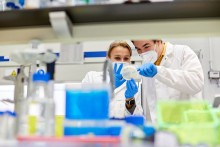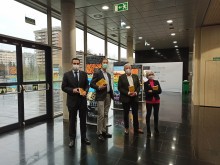Related news by tag Nanotechnology research
Donostia – San Sebastián, a city of (nano) science and technology
The beauty, gastronomy and cultural life of San Sebastian are some of the most outstanding assets of our small city. Nevertheless, following the last virtual issue in ACS nano, San Sebastian also stands as a city of science and technology, specially devoted to the nanoscience field. The present work highlights the contribution of the nanoscience community of San Sebastian to nanoscience and technology.
As described in the editorial of this issue, some of the main representatives of the nanoscience community in San Sebastian stand together, namely, the Nanoscience Cooperative Research Center (CIC nanoGUNE), the Donostia International Physics Center (DIPC), the Basque Center for Macromolecular Design and Engineering (Polymat), the Center for Cooperative Research in Biomaterials (CIC biomaGUNE), the Technology Centers Cidetec, CEIT, and Tecnalia, and the Health Institute Biodonostia along with the Centro de Física de Materiales (CFM), a joint initiative of the University of the Basque Country (UPV/EHU) and Consejo Superior de Investigaciones Científicas (CSIC).
This research force has contributed considerably to ACS Nano with more than 100 publications during the past decade, some of which have already had significant impact and are highlighted in this virtual issue.
As reported by the authors “This collaborative work has been combined with our commitment toward industrial development of nanotechnology both locally and worldwide, which has led not only to an increase in top-notch industrial research in our community but also to the launch of a number of promising nanotechnology-based start-up companies”.
The entities highlighted above, express they are confident that, with the continuous and synergetic support from Spanish and Basque authorities, the research activity in the area of nanoscience and nanotechnology will continue to flourish in our beautiful city.
NanoGUNE launches a new summer internship call for university students
In the framework of this program, the Basque nanoscience research center will be receiving this summer at least ten new students in their 3rd and 4th years of Physics, Chemistry, Biology, and Engineering. For a period of two months, undergraduates will be collaborating with nanoGUNE researchers in their research projects in the areas of nanoscale optics, nanobioengineering, electronic phenomena and magnetism, and nanoscale materials.
NanoGUNE, the big challenge of the small
“NanoGUNE has succeeded in making a place for itself in the network of international science. When nanoGUNE was inaugurated in 2009, we were facing an enormous challenge, and today we are proud because that challenge is being met,” said Jose Maria Pitarke, nanoGUNE’s CEO.


